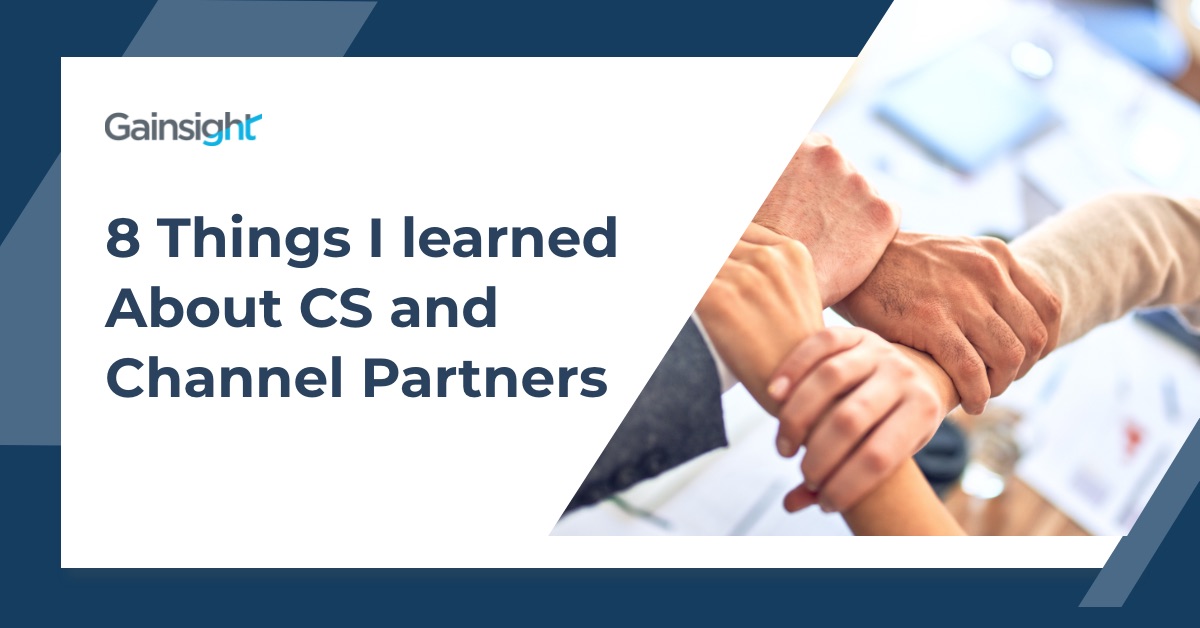
As the cloud business model continues its relentless ascent to take over all software spending, companies are trying to figure out how to marry the SaaS playbook with all of their traditional go-to-market methods. As such, one of the most popular questions we get in discussions with Customer Success leaders is:
“We are getting our arms around doing Customer Success for our direct clients. But how does it work when channel partners are involved?”
To help in our quest to answer that question, we assembled a virtual happy hour for Customer Success leaders in channel-centric businesses. We also invited one tireless Customer Success leader at a channel partner (a large technology distributed company), who dialed in despite it being 1 a.m. for him in Munich! As such, we could tell this would be a hot topic.
In an hour of lively discussion, we took away 8 learnings:
1. Partners Can Become Virtual Members of the CSM Team
One Customer Success leader at a large, publicly-traded technology vendor talked about how he took his top partners and made them extensions of his Customer Success Management team. He shared data with them about client health and enabled them with the same Customer Success strategies he expected his internal team to use. As he suggested, it’s impossible to scale in many businesses, purely using internal resources.
2. Partners Don’t Always Have CSMs—But Some Do
That said, the attendee from the technology distributor pointed out that not every channel partner has staffing that allows them to have dedicated Customer Success Managers. Many resellers are small businesses and don’t have the margins to allow for staff specialization at that level. However, several of the more innovative and well-funded partners are leaning into Customer Success and creating dedicated CS teams.
3. Incent Partners Through Margin Based Upon Adoption
To help bootstrap this Customer Success motion, one leader from a large software company talked about how his company changed its channel partners’ compensation model. They moved from purely paying resellers on bookings to having part of the incentive be adoption milestone based.
4. Incent Partners By Talking About Pull-through Revenue
Another attendee remarked that beyond the direct benefits a partner might see from Customer Success, they tried to quantify for their partners the second-order benefits in terms of adoption and retention. Their resellers saw significantly higher attach rates of the partner’s services when Customer Success programs were created.
5. Vendors and Partners Aren’t Always Aligned
That being said, one participant called out the elephant in the room. Sometimes, vendors and partners are not aligned. For example, a customer may “churn” a partner and go to another partner—with the same end vendor’s technology. For the vendor, this is no big deal. For the original partner, it’s lost revenue. How should the vendor get involved? Should they stay agnostic?
6. Partners May Build Vendor-agnostic CS Programs Over Time
In that spirit, on the partner side, they may also want to become more agnostic toward vendors over time. Today, specific vendors like Microsoft and Cisco drive a significant part of the mindshare for partners to create Customer Success programs. In some cases, resellers are creating CS models dedicated to specific vendors. Over time, this likely won’t scale nor deliver the best customer experience. The value proposition of a partner to the end customer is that the partner thinks about the client’s business holistically—independent of technology. As such, they should be able to deliver true Customer Success in a way that a vendor never could. This requires them to think cross-platform and product-agnostic and optimize outcomes and experience for the end client.
7. Big Challenge Is Data Sharing with Partners
On an operational level, the biggest challenge the group reported was, to no surprise, around data. Vendors are (finally) starting to get their arms around product telemetry and sentiment. How can they scalably enable partners to view this data while preserving security, confidentiality, and privacy?
8. Some Gainsight Customers Giving Access to Partners
While this is a new frontier for most, some attendees who were Gainsight clients shared that they are starting to add partners to their Gainsight instances. In this way, they are securely and discreetly sharing data about customer health, telemetry, and Customer Success playbooks with their partners in a model where each reseller only sees data related to their specific clients.
We left the event with 3 conclusions:
- We are just at the beginning of this journey around Customer Success and Partners, with more questions than answers
- We need to bring groups like this together more frequently to innovate in this new frontier
- We need to pick a Munich-friendly time zone for our next gathering!
Until then, if you’d like to learn more about Gainsight’s new Horizon Analytics module, used to expose data to internal and partner users, click here.

